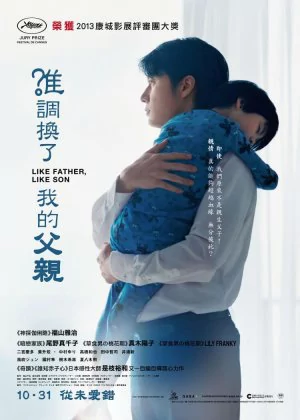Like Father, Like Son
After a very strong start Koreeda's career has been swaying gently up and down. Like Father, Like Son [Soshite Chichi ni Naru] is his latest feature and finds itself in an upwards motion once again. It's not quite up there with Koreeda's best films, but longtime Koreeda fans are bound to find some pleasure here. Like Father, Like Son turns out to be a warm and welcome surprise and proof that his talent is still very much present.

Hirokazu Koreeda (Wandafuru Raifu, Air Doll) has a knack for humane drama, but somehow his latest films felt a little forced. As if the drama itself was more important than the characters, instead of the other way around. With this film he set things straight, putting the characters front and center and drawing dramatic impulses from the events that they encounter along the way.
The central theme of Like Father, Like Son is absolutely excruciating. Even when the credits started to roll, I found it impossible to take a definite stance. Six years after the birth of their only son, a young family receives a phone call from the hospital where they gave birth, with the message that a malicious nurse swapped their kid just days after it was born. From that moment on, a big nature versus nurture/parental love dilemma takes over the film.
It's hard enough deciding between the kid you raised for 6 years and the flesh and blood you've never even seen, to make things worse the Nonomiya family is the complete opposite of the Saiki family. Where the Nonomiya family is rich, cultured and structured, the Saiki family is quite poor but free-spirited and carefree. The two families decide to leave the court out of it and set out to settle the issue amongst themselves, but the issue proves harder to deal with than expected.

Visually Koreeda follows the tropes of the typical Japanese drama. Colors are muted and range from darker blues to greys and browns, the camera work is precise but mostly functional. If you pay attention there are some nice shots in there, but never obvious enough to detract from the characters and the drama. Usually I'd fault a film for that, but in this case the visuals are meant to be functional and the characters strong enough to carry the film by itself, so I never found myself bored with the visuals.
The soundtrack too is pretty predictable. When dealing with your average Japanese drama you can expect light string music and/or piano tunes and that's exactly what you are getting here. The quality of the music is rather high though, but again Koreeda never lets it draw too much attention. Like the visuals, the soundtrack is meant to be functional and supportive. It never intrudes, instead it provides the film with a pleasant vibe that serves as a solid basis.
Koreeda's biggest strength is drawing sublime performances from his cast, and Like Father, Like Son is no exception. Even though both families are heavily contrasted, the setup never feels like a bad plot device. Both families are perfectly believable and their meeting up is played out with enough integrity to make the drama come alive. Extra credits go to Keita Ninomiya, who is perfect as the 6-year-old son of the Ninomiya family. It's amazing how Koreeda manages to coach his younger actors to amazing performances where other directors tend to fail.

Much like After Life, which was carried by the question of which memory you would like to take with you in death, Like Father, Like Son rests on its central dilemma: do you choose the son you've raised for 6 years, or do you go for your own flesh and blood who you've never seen. It's a dilemma that balances on personal beliefs and cultural norms, but without any straight answers. Even after 120 minutes I had no convincing answer ready and I truly hope it's a choice I'll never ever have to make.
Like Father, Like Son is a classic Koreeda film. Strong performances from the entire cast, the characters are given ample room to thrive, the underlying drama is solid and the film features a stellar concept that intrigues even beyond the scope of its running time. While Koreeda's style may be just a little too unadventurous at times, it's solid and functional, never getting in the way of Koreeda's vision. It's another worthy addition to the man's oeuvre and a welcome return to form. Hopefully he can keep it up this time.
